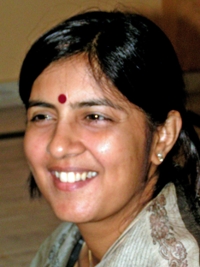As the orientalist William Robertson Smith notes: "Religion did not exist for saving of soul but for the preservation and welfare of the society."[26] Smith's view implies a behavioral function of religion; likewise Tulsi's approach was not transcendental. He neither explicitly associate his movement with any religion, nor did he reject religion; instead he reinterpreted religion according to contemporary needs. One senior nun associated with the movement from its early stages authoritatively summed up Tulsi's approach as follows:
Acharya Tulsi sought to give behavioral aspect to religion. According to him, people maintain strong faith towards their religion, but often there is a gap in their theory and practice. He unraveled three fundamental aspects of a religion: First religion is ritualistic and limited to a sacred space like temple, church, synagogue or a monastery where people offer prayer or worship. Secondly, religion is ethical, which guides one to distinguish between right and wrong deeds. Thirdly, religion is spiritual which leads a practitioner to raise his consciousness to lead a pure life. The Anuvrat Movement does not interfere with any ritualistic practice. However, it only seeks to inspire people to adopt ethical values like restrain from telling lies, cheating people, violence etc. to lead a spiritual life.[27]
Tulsi then was seeking not to replace or compete with existing religious institutions, but to supplement existing practices with a broader moral framework that would bridge the religious with the secular. As Zygmunt Bauman, the global social postmodern thinker states: "In such [postmodern] life we need moral knowledge and skills more often, and more poignantly than either knowledge of the 'laws of nature' or technical skills. Yet, we do not know where to get them; and when (if) they are offered, we are seldom sure we can trust them unswervingly."28 Tulsi recognized that religion could and should be a source of this "moral knowledge" but to be effective in responding to modernization, it must transcend the merely ritual, and it must focus on universal moral themes common to many different traditions in order to inspire trust and not cause division.
 Shivani Bothra
Shivani Bothra
